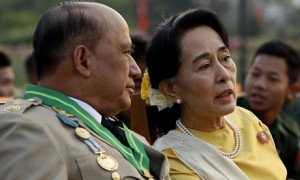Daw Aung San Suu Kyi’s Political Reconciliation with Burma’s Armed Forces
By Burma Partnership • April 1, 2013 On 27 March, Burma’s Armed Forces Day was commemorated with its usual military fanfare. But this year, Daw Aung San Suu Kyi sat in the front row of the parade, raising concerns about her closeness to the army.
On 27 March, Burma’s Armed Forces Day was commemorated with its usual military fanfare. But this year, Daw Aung San Suu Kyi sat in the front row of the parade, raising concerns about her closeness to the army.
Daw Aung San Suu Kyi was similarly criticized for her comment on BBC’s Desert Island Disks radio show about her “fondness” for her father’s army. While Daw Suu appears to be cozying up the Burma Army as an attempt of political reconciliation in her push towards the 2015 elections, the public widely continues to see the country’s security forces as the perpetrators of human rights violations especially in ethnic nationality areas and of brutal crackdowns on civilians in 1988, 2007 and most recently in November 2012 against protesters and monks at the Letpadaung copper mine.
The Burma Army continued this week to launch offensives against the Kachin Independence Army (KIA) in northeastern Shan State, two weeks after the latest peace talks in Ruili, China. There have also been reports of shelling and looting of villages in Kachin State despite President Thein Sein insisting on his visit to Austria at the beginning of the month, “There’s no more hostilities, no more fighting all over the country, we have been able to end this kind of armed conflict.” General Gun Maw, deputy chief of the KIA said after the 11 March talks, “They wanted us to sign a ceasefire agreement first, but there are many issues to discuss about the peace process before we can reach a ceasefire.”
Furthermore, the military has been implicated in the violence in Meikhtila, which has left 43 dead and 12,000 displaced by UN estimates. The UN Special Rapporteur on the situation of human rights in Burma, Tomás Ojea Quintana, revealed, “I have received reports of State involvement in some of the acts of violence, and of instances where the military, police and other civilian law enforcement forces have been standing by while atrocities have been committed before their very eyes, including by well organised ultra-nationalist Buddhist mobs. This may indicate direct involvement by some sections of the State or implicit collusion and support for such actions.”
In President Thein Sein’s speech on 28 March, he praised the army for playing “a pivotal role in safeguarding property and assisting victims.” In reality security forces took 3 days to respond to the violence in Meikhtila, allowing the destruction of property and attacks on people to continue. Human Rights Watch has released satellite images showing the extent of the destruction in the city.
With the military implicit in such violence, it is alarming to see Daw Aung San Suu Kyi sitting front and center at military parades, showing her de facto support for the role of the military in Burma’s transition. Senior General Min Aung Hlaing said at the Armed Forces Day ceremony, “While the country is moving toward modern democracy, our military plays a leading role in national politics. We will keep on marching to strengthen the democratic administrative path wished by the entire people.”
It is clear that the military has no will to let the civilian government lead the country politically, which poses a distinct threat to the Burma’s democratic transition. The truth remains that the military stands in the way of genuine democratic transition through its 2008 Constitution, which still bars Daw Aung San Suu Kyi from running for the presidency. Recently, two former generals from the Union Solidarity and Development Party (USDP) proposed and Parliament agreed to form a commission that will review the 2008 Constitution. Even if the military and its political party, the USDP, agree to particular changes that would allow Daw Aung San Suu Kyi to run for President, without thorough amendments that reduce the military’s power in Parliament, protect human rights for all and ensure a peaceful federal union, Burma will continue to be under the boot of the military rather than a true democracy.
Tags: 2008 Constitution, Armed Conflict, Burma Army, Burma Partnership, Daw Aung San Suu Kyi, Kachin State, Meikhtila, Muslims, ViolenceThis post is in: Blog
Related PostsMyanmar: Release Four “Rohingya Calendar” Political Prisoners
Burma: Rights Priorities for New Government
Myanmar: Scrap or Amend new Law that could Grant Immunity to Former Presidents
Burma Army Moves to Tighten Grip on Power
Sounds of War Taint the Cheers of Election Success









 All posts
All posts